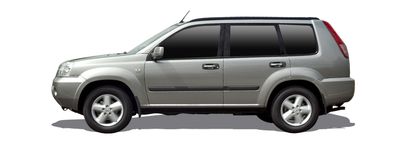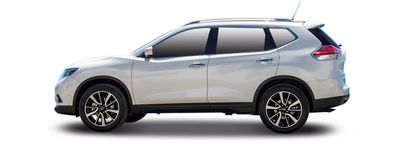Table of Contents
Nissan X-Trail engines
The Nissan X-Trail has established itself as a versatile compact SUV since its launch in 2001 and offers a wide range of Nissan X-Trail engines across four generations. The technological development led from robust naturally aspirated engines to modern turbo engines and finally to innovative e-Power hybrid systems.

Nissan X-Trail engines: Historic generations I & II (2001-2014)

The first two Nissan X-Trail generations characterized the early years of the model and were characterized by robust but technically simple engines. Generation I (2001-2007) and Generation II (2007-2014) shared similar engine designs, with mileages ranging from 250,000 to 350,000 kilometers with proper maintenance. Major repairs were typically due between 150,000 and 200,000 kilometers, mainly on the timing chain, water pump and turbocharger in the diesels. The absolute top engine of these historic generations was the 2.0 dCi with 150 hp from Generation II, which optimally combined power, reliability and acceptable fuel consumption values. The early Nissan X-Trail engines were still free of complex electronics, which made them easy to maintain but less efficient.
Nissan X-Trail gasoline engines: Historic Generations I & II (2001-2014)
The Nissan X-Trail petrol engine range mainly comprised naturally aspirated engines from the QR series. Generation I was dominated by the 2.5-liter QR25DE with 165 hp, supplemented by a smaller 2.0-liter QR20DE with 140 hp. Generation II brought the revised QR25DE with 169 hp and the 2.0-liter MR20DE with 141 hp. These Nissan X-Trail engines were considered reliable but thirsty - consumption figures of 9-11 liters were normal. The best petrol engine was the QR25DE from Generation II, which impressed with its smooth running and durability, while the MR20DE was considered the weakest engine, as it was underpowered for the vehicle weight.
Nissan X-Trail diesel engines: Historic generations I & II (2001-2014)
The 2.2 dCi (YD22DDTi) with 114-136 hp was initially used in Generation I Nissan X-Trail diesels, but was considered problematic due to turbocharger problems and high wear. Generation II brought the significantly better 2.0 dCi (M9R) with 150-173 hp, which developed into the most reliable engine of both generations. This Nissan X-Trail dCi engine offered an excellent combination of performance (400 Nm torque), fuel consumption (6.5-7.5 l/100km) and reliability, with only the timing chain requiring regular inspection.
| Nissan X-Trail engine | Power output | Fuel consumption | Typical weaknesses | Rating |
|---|---|---|---|---|
| QR20DE (Gen I) | 140 HP | 9.5-10.5 l/100km | Underpowered, thirsty | Moderate |
| QR25DE (Gen I) | 165 HP | 10.0-11.0 l/100km | High fuel consumption | Average |
| MR20DE (Gen II) | 141 HP | 8.5-9.5 l/100km | Weak for vehicle weight | Moderate |
| QR25DE (Gen II) | 169 HP | 9.0-10.0 l/100km | Consumption, but robust | Good |
| 2.2 dCi (Gen I) | 114-136 HP | 7.0-8.0 l/100km | Turbocharger, wear | Problematic |
| 2.0 dCi (Gen II) | 150-173 HP | 6.5-7.5 l/100km | Timing chain | Very good |

Nissan X-Trail engines: Generation III (2014-2022)

The third Nissan X-Trail generation marked the transition to modern, efficient engines and brought CVT transmissions as standard for the first time. Mileage reached 200,000 to 300,000 kilometers with proper maintenance, with the diesel engines continuing to show the highest longevity. Critical repairs usually occurred between 120,000 and 180,000 kilometers, mainly on the CVT transmission, turbocharger and injection system. The absolute highlight was the 1.6 dCi with 130 hp - an economical and reliable engine that perfectly matched the vehicle's characteristics. However, this generation suffered from the introduction of the CVT transmission, which impaired driving dynamics and was considered a weak point.
Nissan X-Trail petrol engines: Generation III (2014-2022)
The Nissan X-Trail petrol engine range was reduced to two main engines: the 1.6 DIG-T (Turbo) with 163 hp and the 2.0-liter MR20DD with 144 hp. The Nissan X-Trail 1.6 DIG-T offered decent performance with acceptable fuel consumption (7.0-8.5 l/100km), but suffered from occasional turbocharger problems and coking of the intake valves. The 2.0-liter naturally aspirated engine proved to be more reliable, but underpowered for the vehicle's weight. Both Nissan X-Trail engines struggled with the sluggish CVT gearbox, which significantly affected driving dynamics.
Nissan X-Trail diesel engines: Generation III (2014-2022)
The Nissan X-Trail 1.6 dCi (R9M) with 130 hp dominated the diesel range and developed into the best engine of this generation. With a fuel consumption of just 4.8-5.8 l/100km and high reliability, it was ideal for frequent drivers. It was complemented by the 1.7 dCi with 150 hp, although this was offered less frequently. Both Nissan X-Trail dCi engines featured modern common-rail injection and SCR catalytic converters, but occasionally had problems with clogged particulate filters on short journeys.
| Nissan X-Trail engine | Power output | Fuel consumption | Typical weaknesses | Rating |
|---|---|---|---|---|
| 2.0 MR20DD | 144 HP | 7.5-8.5 l/100km | Underpowered, sluggish CVT | Moderate |
| 1.6 DIG-T | 163 HP | 7.0-8.5 l/100km | Turbocharger, valve coking | Average |
| 1.6 dCi | 130 HP | 4.8-5.8 l/100km | Particle filter for short journeys | Very good |
| 1.7 dCi | 150 HP | 5.2-6.0 l/100km | Rare, particulate filter | Good |

Nissan X-Trail engines: Generation IV (2022-today)
The current Nissan X-Trail generation revolutionized the drive concept with the introduction of e-Power technology as the main drive. This innovative solution combines a petrol engine as a generator with an electric motor for the drive and promises mileages of over 300,000 kilometers by relieving the combustion engine. As the generation has only been available since 2022, there is no long-term experience yet, but initial tests show promising approaches. The top-of-the-range engine is the e-Power system with 204 hp, which combines electric driving dynamics with the range of a petrol engine. However, the complex technology could lead to higher repair costs.
Nissan X-Trail e-Power hybrid drive: Generation IV (2022-today)
The Nissan X-Trail e-Power system consists of a 1.5-liter petrol engine (157 hp) as a generator and an electric motor (204 hp) for propulsion. This innovative concept enables purely electric driving with an unlimited range. The Nissan X-Trail e-Power offers smooth power delivery without gear changes and a fuel consumption of 5.8-6.8 l/100km. As the only available Generation IV powertrain, the e-Power system is becoming the signature engine of this generation, although its complexity raises questions about long-term reliability.
Nissan X-Trail mild hybrid petrol engine: Generation IV (2022-today)
In addition to the e-Power system, Nissan offers a 1.5-liter turbo engine with mild hybrid technology and 163 hp in some markets. This Nissan X-Trail engine combines direct mechanical drive with electric assistance, but is significantly less common than the e-Power system.
| Nissan X-Trail engine | Power output | Fuel consumption | Typical weaknesses | Rating |
|---|---|---|---|---|
| e-Power (1.5 + e-motor) | 204 HP | 5.8-6.8 l/100km | Complex technology, unknown | Good |
| 1.5 Turbo Mild-Hybrid | 163 HP | 6.5-7.5 l/100km | Rarely available | Average |

Conclusion: The best Nissan X-Trail engines of all generations
The development of Nissan X-Trail engines shows a clear shift from conventional drive systems to innovative hybrid solutions. While the early generations were characterized by robust but thirsty engines, the current generation relies entirely on electrification. The diesel engines have remained the most reliable powertrains over three generations, while the petrol engines only offer a convincing alternative with e-Power technology.
- Best Nissan X-Trail gasoline engine:
The Nissan X-Trail e-Power system (204 hp, Generation IV) combines electric driving dynamics with the range of a petrol engine and revolutionizes the drive concept.
- Best Nissan X-Trail diesel engine:
The Nissan X-Trail 1.6 dCi (130 hp, Generation III) offers the best combination of reliability, economy and everyday usability across all generations.
- Best Nissan X-Trail hybrid engine:
The Nissan X-Trail e-Power system (Generation IV) is the only hybrid powertrain available and sets new standards for efficiency and driving comfort.
For maintenance and spare parts for all Nissan X-Trail generations, AUTODOC offers a comprehensive range of original and quality spare parts with fast delivery.















